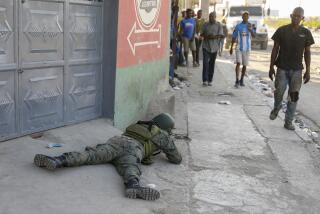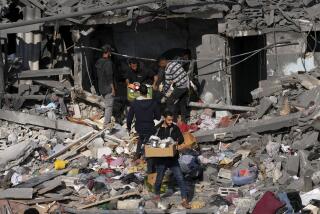Foreign Minister of Bosnia Slain; Serbs Add to Hostages : Europe: Serbs in Croatia say they downed copter, killing official and six others. More than 300 U.N. troops held as diplomatic efforts to end crisis make no progress.
- Share via
BELGRADE, Yugoslavia — Bosnia’s foreign minister was killed Sunday when his helicopter was shot down over Serb-held territory, and Bosnian Serbs stepped up their defiance of the world’s major powers by capturing yet another group of U.N. hostages, this time Britons.
Serbs in neighboring Croatia, who are allied with the Bosnian Serbs, claimed responsibility for downing the helicopter carrying Bosnian Foreign Minister Irfan Ljubijankic. He was the highest-ranking government official killed in three years of war.
Emboldened by the failure of the world to stop them, Serbs again shelled a Muslim city that was the site of a civilian massacre last week and fired antiaircraft weapons at NATO reconnaissance warplanes.
Another day of diplomatic consultations and urgent meetings from Washington to Paris failed to produce any resolution to a crisis that is swiftly careening toward disaster.
“We hope that we will get some guidance and backing,” U.N. spokesman Alexander Ivanko said in Sarajevo, the capital of Bosnia-Herzegovina. “A lot of thought will have to go into our next step, because it will probably be the most important step the international community makes in this century.”
North Atlantic Treaty Organization jets bombed Bosnian Serb ammunition depots last week as punishment for the Serbs’ failure to turn in heavy weapons they had stolen from the United Nations. But far from being intimidated, the Serbs retaliated with the deadly shelling of U.N.-declared Muslim “safe areas” and the rounding up of U.N. peacekeepers as hostages. More than 300 had been seized by Sunday night, many of them French.
Now the United Nations and its member countries must decide whether to renew attacks on the Serbs, risking the lives of the hostages, or to retreat in utter humiliation and risk the ability of the United Nations to continue as an institution of any worth.
Late Sunday, British Prime Minister John Major announced the dispatch of up to 6,000 more troops to the strife-torn area.
After an emergency meeting at No. 10 Downing St. that lasted three hours, Major announced steps to “greatly strengthen” the ability of the British peacekeeping contingent to defend itself “in view of this much more dangerous environment.”
But military specialists noted that the new forces consist of artillery and engineering units--which could play a vital role if the British and other U.N. forces need to withdraw from Bosnia.
Meanwhile, U.S. military commanders ordered a task force of amphibious warships carrying 2,000 Marines, many of them trained in special operations techniques, to stand by off the coast of Bosnia.
The Marines, members of the 24th Marine Expeditionary Unit based at Camp Lejeune, N.C., had been conducting training exercises off Sardinia.
Pentagon officials said the order was intended as a “precautionary measure” in case the situation in Bosnia worsens and U.N. troops are forced to evacuate.
Officials said there was no reason to believe that the movement by the Marines marked the start of any large-scale military operations by U.S. ground troops. President Clinton has pledged not to use U.S. troops in combat in Bosnia but has agreed to help evacuate U.N. forces.
In France, which has the most troops on duty in the Balkans, most are blaming the peacekeeper hostages’ humiliation, as it is being called there, on the United Nations and the lack of world resolve to bring peace to the former Yugoslav federation.
Although France has lost 39 of its troops in the Balkans since 1992, most French people still believe strongly in the importance of restoring peace to that important region of Europe. To the French, the soldiers coming home in coffins are part of the price the country is willing to pay for peace.
But new French President Jacques Chirac is under growing domestic pressure to persuade the United Nations, and other Western leaders, to take more aggressive diplomatic actions and, at the same time, rewrite the rules of engagement to allow French troops to protect themselves.
Clinton’s foreign policy advisers met Sunday at the White House to discuss the crisis. A spokesman said afterward that Clinton, who did not attend the meeting but was briefed on developments in Bosnia throughout the day, favors increasing the strength of the U.N. force there--but not with U.S. troops.
A spokesman for Secretary of State Warren Christopher, who was leaving for the Netherlands on Sunday night for a crisis meeting on Bosnia, said the White House meeting focused on “a range of options for strengthening UNPROFOR,” as the U.N. force in Bosnia is known.
Citing concern for the hostages, Administration officials refused to comment further on the White House meeting other than to say that it focused on the options that Christopher will present when he meets today in The Hague with officials of the five-nation Contact Group--the United States, Russia, France, Britain and Germany--that is trying to mediate an end to the war.
*
Ignoring the world’s outrage, Bosnian Serbs on Sunday overran four U.N. observation posts outside a U.N. “safe area,” the eastern enclave of Gorazde, and captured 33 British peacekeepers, U.N. officials said.
That brought to more than 300 the number of U.N. personnel being held, many forced to serve as human shields against further NATO air strikes.
The commander of the Bosnian Serb army, Gen. Ratko Mladic, told the U.N. commander for Bosnia, Lt. Gen. Rupert Smith, that he could not vouch for the safety of the Britons unless four Serbs captured by the United Nations were returned to the Serbian army.
Smith responded that the four will be investigated for war crimes, according to U.N. officials who described the telephone conversation between the two generals.
The four Serbs were captured Saturday in a fierce firefight between French peacekeepers and the Serbs for control of a strategic bridge in Sarajevo. Two French soldiers and four Serbs were killed in the battle. Ivanko, the U.N. spokesman, had said Saturday that a third Frenchman died of his wounds, but on Sunday U.N. officials said a third soldier had not died.
The French finally regained control of the bridge Sunday after the Serbs withdrew.
Ljubijankic, the Bosnian foreign minister, was killed along with at least three other government officials and a three-member crew when their helicopter was shot down near the northwestern Bosnian town of Bihac, a U.N.-protected “safe area” where government forces are battling Serbs from Bosnia and Croatia as well as a renegade Muslim faction.
Although U.N. officials could not immediately confirm who had downed the aircraft, Serbs fighting to carve out a republic in the Krajina region of neighboring Croatia claimed responsibility late Sunday.
Ljubijankic was the second senior government official killed in the war. Deputy Prime Minister Hakija Turajlic was shot to death in 1993 by Bosnian Serbs at a checkpoint outside Sarajevo. He was under the protection of French U.N. peacekeepers at the time.
Russia--the Serbs’ principal ally in the region--delayed its intervention in the crisis. Prime Minister Viktor S. Chernomyrdin said Saturday that Russia’s ministers of defense and foreign relations had left for the former Yugoslav federation to seek a cease-fire. But Sunday, officials said the ministers had not departed after all, and the timing of their mission was left unclear.
Times staff writers Scott Kraft in Paris, William Tuohy in London and Michael Ross and Art Pine in Washington contributed to this report.
* U.N.-U.S. TENSIONS: Attacks on peacekeepers will strain alliance. A9
More to Read
Sign up for Essential California
The most important California stories and recommendations in your inbox every morning.
You may occasionally receive promotional content from the Los Angeles Times.














